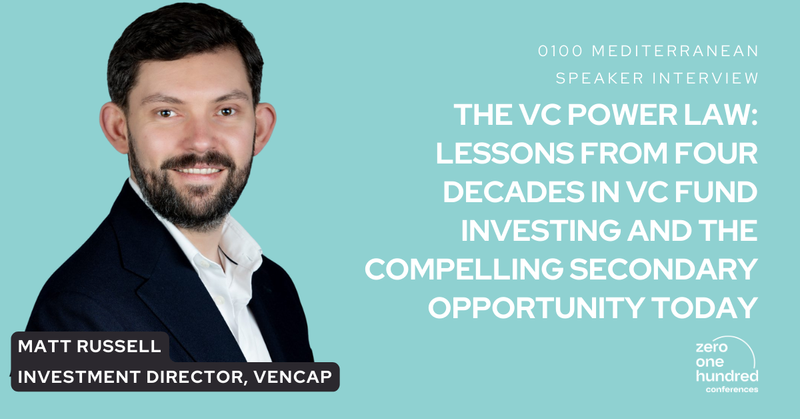In this Speaker Interview, we sat down with Matt Russell, Investment Director at VenCap International plc. VenCap was founded in 1987 and has committed around $3 billion to over 450 venture capital funds in the US, Europe, China, and India.
VenCap investors have had early-stage access to the likes of Google, Facebook, Spotify, Stripe, OpenAI, and Databricks among many other generational technology companies.
Matt is responsible for leading VenCap’s secondary strategy and will be speaking at the 0100 Conference Mediterranean in Milan at the panel “VC Secondaries – the Market Opportunity and Ways to Select the Right Fund” with key industry players: Luca Mannucci, Managing Partner at Sella Venture Partners, and moderated by Nick Hendra, Venture Partner at AAF Management.

How would you describe VenCap’s investment strategy?
Venture capital is a power law asset class. This means that most VC-backed companies fail and the majority of the value created by the asset class comes from the top-1% of companies each year.
It is only by accessing the very best companies and achieving meaningful ownership that investors can generate the strong performance that venture capital can offer. Fortunately, there is a small group of VC managers that consistently back these top-1% companies over time.
VenCap’s primary investment strategy is to concentrate our portfolio exclusively on these managers. We don’t invest in emerging managers and we don’t invest in solo GPs. VenCap simply backs the firms that have a demonstrated ability to find and access the companies that really matter.
Why are you excited about the opportunity in venture capital secondaries?
This is not private equity where returns follow a normal distribution; because of the power law, you need to have exposure to the best companies and a clear information angle in order to succeed.
Given our longstanding relationships and exclusive focus on VC, we have a clear advantage in accessing and then underwriting the very best secondary opportunities. In terms of the fundamentals driving supply, in the US alone there is around $1 trillion of unrealised Net Asset Value in venture capital funds. If you combine that with distribution activity being at its lowest point since 2009, that is making for extremely compelling deal flow.
From January to September, we have received around $7.4 billion in VC secondary deal flow. In terms of pricing, the market average for venture capital secondaries (as a % of NAV) has fallen by around 20% from the peak we saw in 2021.
That creates an exciting secondary opportunity for our investors – exposure to top-1% companies backed by high-quality VC firms, attractive entry pricing, and shorter duration.
What are the sources of deal flow and how do you decide which ones to focus on?
We are focused on gaining exposure to top-1% companies where we have a clear information angle, then it comes down to pricing and returns. That lens allows us to quickly focus-in on a select few opportunities at any one time.
In terms of deal flow sources, we are introduced to opportunities from our primary relationships, other VC funds, LPs directly, and secondary advisors. Given the barriers to entry I’ve described, many of the discussions with sellers are bilateral rather than broad auction processes.
How meaningful are optical discounts vs. NAV for generating secondary returns?
Optical discounts vs. NAV are pretty much irrelevant as a predictor for cash-on-cash returns, particularly in VC. Fund NAVs can be conservative or aggressive and that goes to the extreme in VC. This can be an opportunity or a risk but highlights the importance of understanding what you are buying.
Every week we see companies being held at completely different valuations by VC funds. Often a smaller discount on one fund is better intrinsic value than a larger one on another.
Some of our very best-performing deals have been at an optical premium vs. a conservative NAV in a portfolio that has delivered strong growth. For us, it is all about accessing great companies with strong growth prospects rather than hoping to make a return on mediocre assets with a big enough discount.
To wrap-up, what are some of the biggest misconceptions you see in the VC fund industry today?
Many investors just don’t understand the implications of the power law in the VC asset class. They don’t realise how important optimising for quality is, and don’t appreciate how small advantages compound over time for the very best VC firms. The top-1% companies are founded by the greatest entrepreneurs in the world; they want to work with the best VC managers and this creates a flywheel effect. This is why you see persistence in VC returns and not Private Equity.

